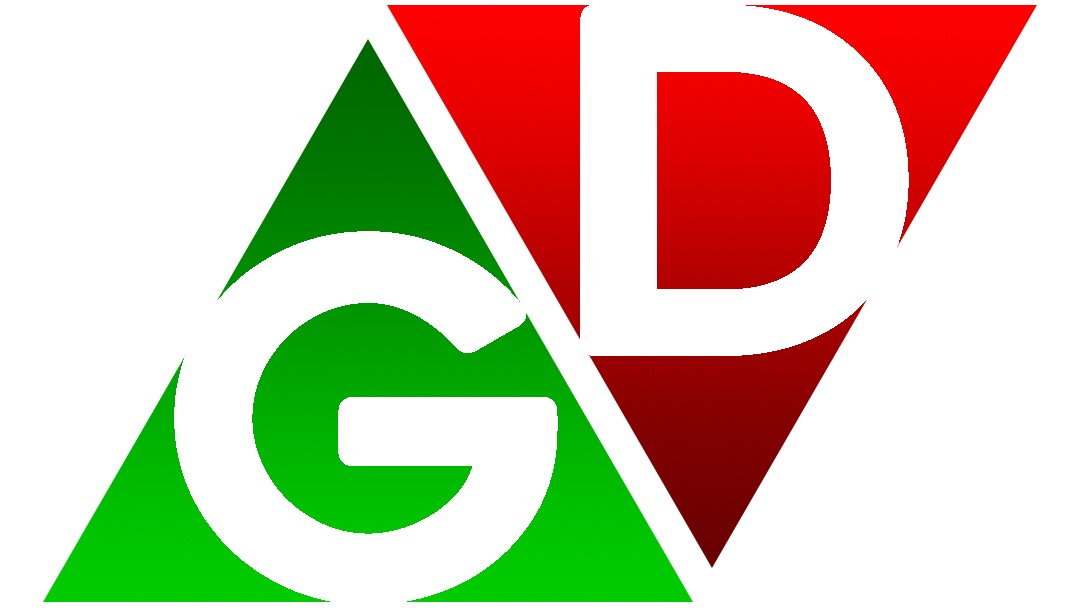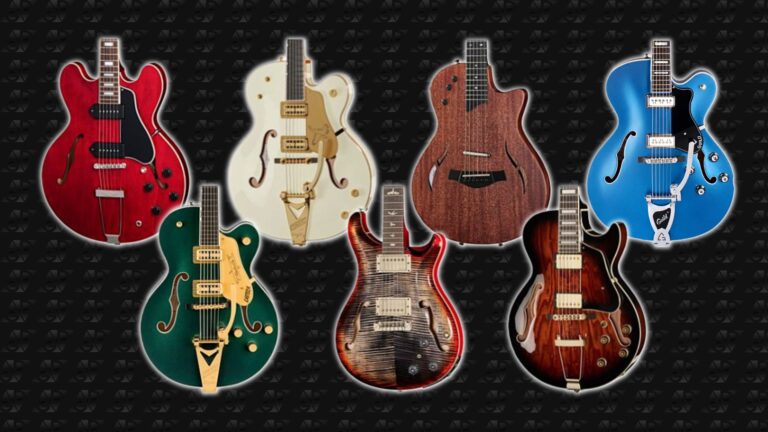3/4-size acoustic guitars are like the perfect travel or “sofa-jamming” guitars, small enough to hold easily, light enough to carry around, and still sounding musical. They’re great if you have smaller hands, live in a small apartment, or just want a comfy guitar that doesn’t feel heavy. They can also be ideal for kids or beginners who are learning chords and basic playing.
There are so many good 3/4 guitars out there, from simple budget models to quality builds with surprisingly decent tone. So here’s the question: which 3/4-size acoustic guitar do you think is the best? Vote for your favorite below, and feel free to share why you like it, maybe it’s the comfort, the sound, or just its portability. Don’t forget to leave your thoughts and experiences in the comments, it could help others pick their next guitar!
1. Taylor Baby Mahogany BT2
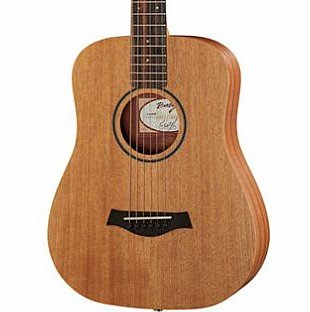
The Baby Taylor Mahogany is a 3/4-scale dreadnought that proves small guitars can pack a big punch. Ultra-portable and easy to play, it’s perfect for travel, practice, or as a starter instrument for younger players. Despite its size, the Baby Taylor delivers a sweet, full tone that works beautifully in alternate tunings, with a capo, or even slide playing. The mahogany top adds a warm midrange with a touch of “bluesy edge,” giving it character beyond its dimensions. Finished in durable varnish, it not only looks great but feels smooth and protected for years of use. Compact, versatile, and full of personality, the Baby Taylor Mahogany is a little guitar with a big voice.
2. Taylor GS Mini-e Mahogany
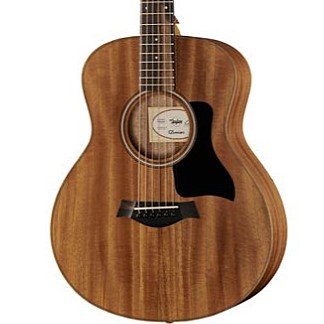
The Taylor GS Mini-e Mahogany is proof that great tone can come in a smaller package. With its Grand Symphony-inspired body, this compact acoustic-electric delivers punch and resonance far beyond its size. A mahogany top paired with layered sapele back and sides creates a warm, full sound, while the ebony fretboard adds smooth playability. Whether you’re practicing at home, recording, or performing live, the GS Mini-e is versatile and easy to handle. Thanks to Taylor’s ES-B electronics, you can plug in anytime and enjoy natural amplified tone, complete with onboard controls and a tuner. Portable, reliable, and rich in sound, the GS Mini-e Mahogany has earned its place as a player favorite.
3. Harley Benton GS Travel Mahogany
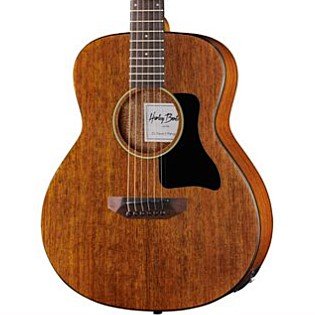
The Harley Benton GS-Travel Mahogany is built for adventure, offering portability without sacrificing tone. Compact and easy to carry, it features a 23.5" scale length and a shortened 43mm neck that still gives you plenty of room to play comfortably. The mahogany body not only looks stylish with its natural finish but also delivers a surprisingly rich, warm sound while being tough enough to handle life on the road. Whether you’re strumming by the campfire, practicing on the go, or just need a reliable travel companion, this guitar proves it’s more than a simple travel instrument. The GS-Travel Mahogany is small in size but big in character.
4. Harley Benton GS Travel Spruce
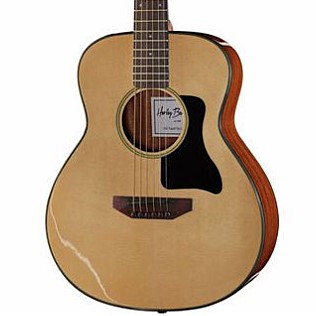
The Harley Benton GS-Travel Spruce is the perfect companion for life on the move. Compact and easy to carry, it features a spruce top paired with a mahogany body that’s both stylish and durable. Despite its smaller size, this guitar delivers a surprisingly rich, full sound that makes it more than just a travel instrument. With a 23.5" scale length and a shortened 43mm neck, it offers comfortable playability while still giving you plenty of room to explore chords and melodies. Whether you’re strumming by the campfire, practicing on the go, or simply need a reliable guitar that fits anywhere, the GS-Travel Spruce is ready to go wherever you do.
5. Martin 000CJr-10E Streetmaster
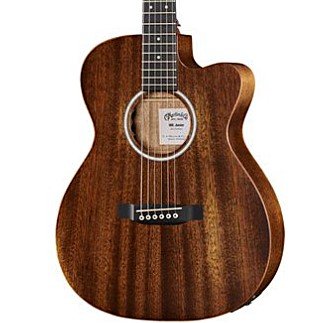
The Martin 000CJR-10E StreetMaster is a compact auditorium-style acoustic-electric that combines comfort, style, and great tone. Its smaller body size makes it easy to play, while still delivering a balanced sound with plenty of character. The distressed StreetMaster finish gives it a worn-in look that feels like an old favorite from the start. A thinner body and high-performance neck taper add to the smooth playability, making it perfect for long sessions or live gigs. Equipped with Fishman Sonitone electronics, it’s ready to plug in and perform with natural, authentic tone. Whether you’re just starting out or need a reliable stage companion, this guitar is built to inspire.
6. Yamaha JR1
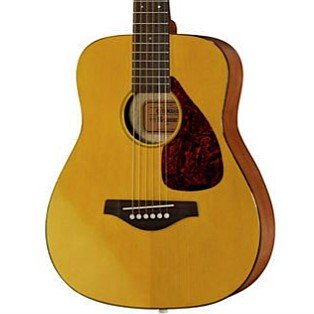
The Yamaha JR1 is a compact acoustic that delivers the feel and tone of a full-size guitar in a smaller, more manageable package. Modeled after Yamaha’s popular FG folk series, it features a spruce top and meranti body for a warm, resonant sound that’s surprisingly big for its size. Perfect for young players, those with smaller hands, or anyone needing a travel-friendly instrument, the JR1 makes playing chords and melodies easy and comfortable. Despite its reduced dimensions, it offers impressive projection and quality, making it a reliable choice for practice or performance. Plus, it comes with a gig bag, so you’re ready to take it anywhere.
7. Martin D JR-10
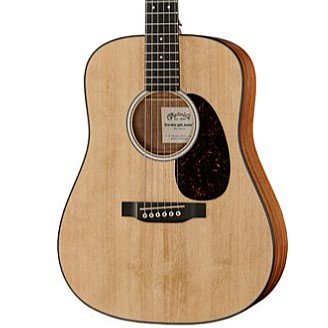
The Martin DJr-10 Dreadnought Junior delivers the bold sound of a full-size dreadnought in a more compact, comfortable body. With satin-finished sapele back and sides in a rich cherry hue and a spruce top, it offers a warm, resonant tone with plenty of clarity. The hand-rubbed neck features a high-performance taper for smooth playability, while the thinner 000-style body depth and rounded edges make it easy to hold during long sessions. Perfect for players who want big sound without the bulk, the DJr-10 is equally suited for practice, travel, or performance. Plus, it comes with a soft gig bag, so you’re ready to take it anywhere.
8. Yamaha APXT2
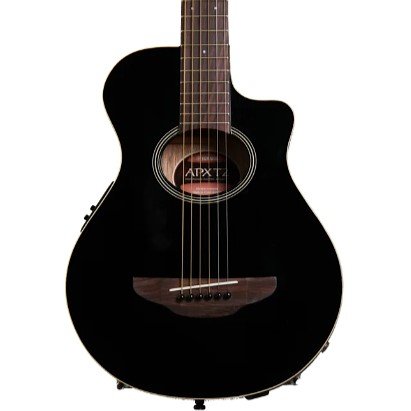
The Yamaha APXT2 is a compact acoustic-electric that packs the quality of Yamaha’s best-sellers into a smaller, travel-friendly size. Inspired by the popular APX500, this 3/4-scale guitar is easy to play and perfect for younger players, those with smaller hands, or anyone needing a reliable companion on the go. Despite its size, it delivers clear, resonant tone, and when it’s time to plug in, the System 68 contact pickup and active preamp ensure great amplified sound. With a built-in tuner, you’ll always stay in tune, and the included padded gig bag makes it ready for travel. Portable, versatile, and fun to play, the APXT2 is a guitar that goes wherever you do.
9. Taylor GS Mini-e Rosewood
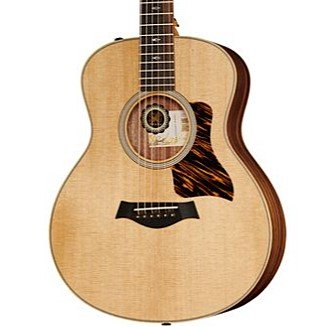
The Taylor GS Mini-e Rosewood SB brings a touch of luxury to Taylor’s beloved small-bodied lineup. Featuring layered Indian rosewood back and sides with a torrefied spruce top, it delivers rich tone and elegant style in a compact, easy-to-play package. Chrome hardware, proprietary tuners, a multi-ring rosette, and a Crelicam ebony bridge add premium detail, while the firestripe pickguard gives it a vintage flair. Comfortable and versatile, this guitar is perfect for strumming at home or performing on stage. With Taylor’s ES-B 1.2 electronics, you’ll get authentic amplified sound plus handy controls and a built-in tuner. Stylish, portable, and sonically impressive, the GS Mini-e Rosewood SB is a true player’s companion.
10. Taylor GS Mini-e Koa
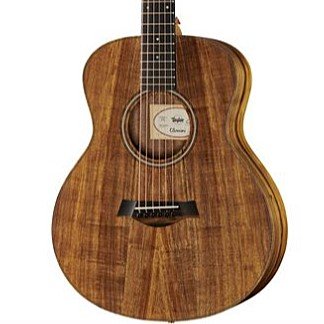
The Taylor GS Mini-e Koa is a compact acoustic-electric that blends stunning looks with rich, resonant tone. Its solid koa top and layered koa back and sides deliver warmth and depth that make every strum feel inspiring. The smaller body size makes it easy to play anywhere, whether you’re writing in the studio, jamming at home, or performing on stage. Equipped with Taylor’s ES-B electronics, you get natural amplified sound plus handy features like tone controls, a built-in tuner, and a low-battery indicator to keep you gig-ready. Stylish, portable, and full of character, the GS Mini-e Koa is proof that great things come in smaller packages.
11. Taylor Baby BT Koa
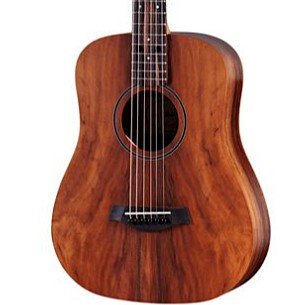
The Taylor BT-Koa takes the Baby Taylor travel guitar concept and gives it a luxurious twist. Crafted with Hawaiian koa, it features a solid koa top and laminated back and sides, offering both striking looks and a warm, sparkling tone. Compact and easy to carry, it’s perfect for players who want a guitar that travels well without sacrificing elegance or sound quality. The BT-Koa delivers rich resonance and shimmering overtones that make it stand out from typical small-bodied acoustics. Stylish, portable, and full of character, this guitar is ideal for musicians who want to shine wherever they play, from the living room to the stage.
12. Taylor Baby BT1 Walnut
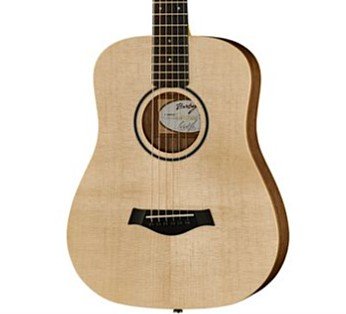
The Baby Taylor is a 3/4-size dreadnought that proves small guitars can still deliver big tone. Built with a solid spruce top and layered walnut back and sides, it produces a warm, resonant sound with clear note definition and a shimmering top end. The compact body is comfortable to hold, eliminating unwanted boominess while making it easy for players of all ages to enjoy. A sleek maple neck and smooth fingerboard add to the effortless playability, whether you’re a beginner or a seasoned traveler looking for a reliable companion. Stylish, portable, and full of character, the Baby Taylor is a guitar you’ll fall in love with from the very first strum.
13. Taylor GS Mini Sapele

The Taylor GS Mini Sapele is a compact acoustic that delivers big sound with elegant style. Featuring sapele back and sides paired with a torrefied Sitka spruce top, it produces a tone that’s rich, balanced, and surprisingly powerful for its size. The mahogany neck with Taylor’s signature carve and an ebony fingerboard make playing smooth and comfortable, whether you’re strumming chords, fingerpicking, or rocking out with punchy power progressions. Versatile and easy to handle, this guitar is perfect for all-purpose playing at home, in the studio, or on the go. Stylish, reliable, and full of character, the GS Mini Sapele proves why Taylor’s small-bodied guitars have become player favorites everywhere.
14. Fender FA-15
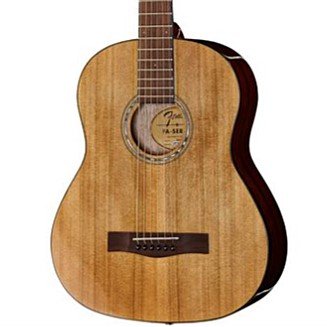
The Fender FA-15 is a compact guitar that’s perfect for beginners and seasoned players alike. Its smaller size makes it comfortable for players of all ages, while the all-laminate body and sturdy nato neck deliver a warm, resonant tone built to last. Durable and easy to handle, it’s a great choice for practice, travel, or everyday playing. Classic touches like the 3+3 headstock design and walnut bridge give it a traditional acoustic look, while the wallet-friendly price makes it accessible to anyone. Reliable, stylish, and fun to play, the FA-15 proves that great guitars don’t have to come with a big price tag.
15. Harley Benton Custom Line CLGS-10S

The Harley Benton CLGS-10S Travel is a deluxe compact guitar that’s built to impress both on the road and at home. With a solid spruce top, it delivers a lively, dynamic tone, while the mahogany body adds warmth and depth. Elegant walnut binding gives it a refined look that sets it apart from typical travel guitars. At 23.5" scale length, it provides enough string tension for rich resonance while still being easy to play. Comfortable, stylish, and versatile, the CLGS-10S is more than just a travel companion, it’s a guitar you’ll reach for every day, whether you’re practicing, performing, or simply enjoying music wherever you are.
16. Ibanez PF2MH
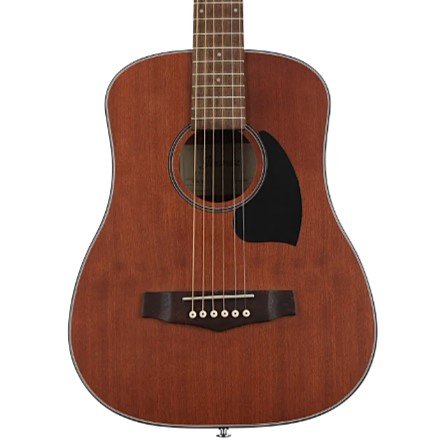
The Ibanez PF2MH-OPN is a compact 3/4-size dreadnought that makes an excellent travel guitar or beginner’s companion. Built with a sapele body, it delivers a warm tone with clear mids, balanced bass, and sparkling treble. A compensated Graph Tech TUSQ bridge insert ensures clean intonation and comfortable low action, while chrome die-cast tuners keep your tuning rock solid. The flat neck profile feels natural in the hand, and the short 580mm scale length adds to the smooth, easy playability. Affordable, portable, and reliable, this guitar is designed to go wherever you do. Plus, it comes with a gig bag, making the PF2MH-OPN ready for adventures right out of the box.
17. Luna Safari Muse Mahogany Travel

The Luna Safari Muse Mahogany is a 3/4-size travel guitar that delivers big value in a compact design. With a mahogany body and top, it produces a warm, rich tone that’s impressive for its size. The satin-finished mahogany neck feels smooth and fast, making it comfortable to play whether you’re strumming or picking. Stylish and easy to handle, this guitar is perfect for beginners, seasoned players, or anyone who wants a reliable travel companion. Best of all, it comes with a quality gig bag, so you’re ready to take it on the road. Portable, great-sounding, and eye-catching, the Safari Muse Mahogany is built for adventure.
18. Luna Aurora Borealis
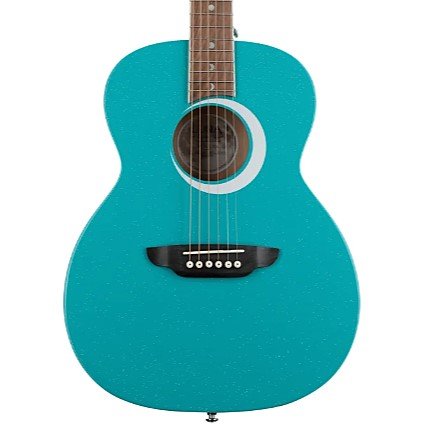
The Luna Aurora Borealis is a 3/4-size acoustic that’s perfect for students, younger players, or anyone wanting a stylish travel guitar. With its 22.5" scale length, it’s easy to handle and comfortable to play, making it a great starter instrument. Despite its smaller size and affordable price, the Aurora Borealis delivers a surprisingly big sound in a fun, playable package. Luna’s signature Crescent Moon soundhole and Moon Phase fingerboard inlays give it a distinctive look that stands out from typical student guitars. Compact, eye-catching, and beginner-friendly, the Aurora Borealis is an ideal choice for learning, practicing, or taking music with you wherever you go.
19. Luna Safari Koa Supreme Travel
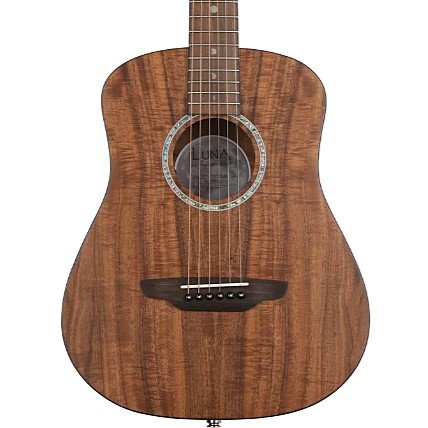
The Luna Safari Koa Supreme is a travel-friendly acoustic-electric that combines elegant design with serious performance. Its solid koa top delivers warm, rich tone with sparkling overtones, while the real bone nut adds clarity and articulation to every note. Compact at 22.5" scale length, it’s small enough to fit in an overhead bin, making it the perfect companion for musicians on the move. When it’s time to plug in, the Fishman Sonitone electronics provide natural amplified sound with reliable controls. Stylish, portable, and built to perform, the Safari Koa Supreme proves that a travel guitar can look stunning, feel comfortable, and sound every bit as good as a full-size instrument.
20. Taylor TSBTe Taylor Swift
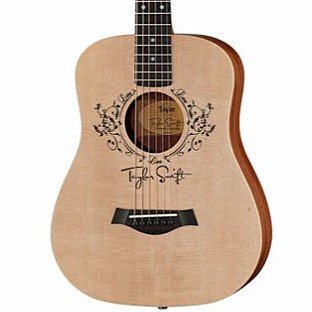
The Taylor Swift Baby Taylor-e is a compact acoustic-electric that blends Taylor’s craftsmanship with Swift’s signature touch. Inspired by her early songwriting days on a Baby Taylor, this 3/4-size guitar is comfortable, fun to play, and perfect for travel or everyday use. A Sitka spruce top with layered sapele back and sides delivers a tone that’s rich and full, far beyond its size. Custom graphics add a unique look, while Taylor’s Expression System Baby electronics provide natural amplified sound, complete with a built-in tuner for convenience. Whether you’re writing songs, performing, or just enjoying a portable guitar with big personality, the Taylor Swift Baby Taylor-e is a standout choice.
The buttons on this page are affiliate links, so we may earn a commission at no extra cost to you.
Suggest a product
If you believe a suitable product is missing from the list, kindly email us at suggestion@geardecider.com with the name of the list and the suggested product. If the product aligns with the list’s criteria, we will add it promptly.
A 3/4-size guitar is smaller and lighter than a full-size acoustic. Its neck is a bit shorter, and the body is more compact. This smaller size has a few big advantages:
– Comfort & Ease: Because the body is lighter and smaller, it’s easier to hold and play, especially good for beginners, young players, or people with smaller hands.
– Portability: Easy to carry, pack, or take with you, good for travel, practice on the go, or casual playing at home or outdoors.
– Approachable if You’re New: Chords are a bit easier because frets and string spacing are usually closer – less stretching needed for your fingers.
Of course there are trade-offs: you get slightly less bass and volume compared to a full-size acoustic. 3/4 guitars often don’t deliver as much loudness or deep low-end, but many players accept that in exchange for comfort and convenience.
What to Look For When You Buy a 3/4 Guitar
Before buying a 3/4 guitar, think about:
– String type: Nylon-string guitars are softer on fingers (good for beginners), steel-string ones give a brighter, more “acoustic guitar” sound.
– Body and neck size: Make sure the guitar feels comfortable in your hands and on your lap or when standing.
– Tone quality: Even small guitars can sound nice if made with good wood or good build, expect decent mids and highs, but don’t expect huge bass or volume.
– Purpose: If you want it for travel, practice, or small jams, 3/4 is great. If you plan full-band gigs or heavy strumming, maybe a full-size acoustic suits better.
Who 3/4 Guitars Are Especially Good For
– Beginners and young players: Easier on small hands, simpler to handle, and often gentler on fingers if they’re nylon-string.
– People with limited space: For small apartments, dorm rooms, or couch-playing. Comfortable size makes a big difference.
– Travelers or frequent movers: Smaller size and lighter weight make them ideal for packing, trips, or easy transport.
– Casual players / couch strummers / songwriters: Perfect for quick practice, songwriting sessions, or relaxed playing when you don’t want to lug a full-size guitar.
What to Expect and What’s the Tradeoff
Because of the smaller body and scale:
– The sound will be lighter. You get less bass, less deep resonance, and usually less volume compared to a full-size guitar. That means maybe not ideal for loud group playing or band gigs.
– Tone will be best for soft strumming, fingerpicking, or intimate songs rather than heavy strumming or booming projection.
– With nylon-string models: easier on the fingers, but a different tone (softer, mellow) compared to steel-string acoustics.
Still, for what you lose in size and power, you gain a lot in comfort, ease, and portability.
Final Thoughts
If you want a guitar that’s easy to handle, lightweight, comfortable, and fun to play, especially for practice, travel, or relaxed sessions, a 3/4-size acoustic guitar is a great choice. It won’t rock a stadium, but for home playing, songwriting, portability, or learning, it might just become your favorite “everyday guitar.”
The “best” 3/4 guitar depends on what you want: softer nylon tone and comfort, or a simple budget-friendly steel or classical guitar to learn on. Try a few if you can, see how they feel and sound to you and go with the one that makes you pick it up most often.
